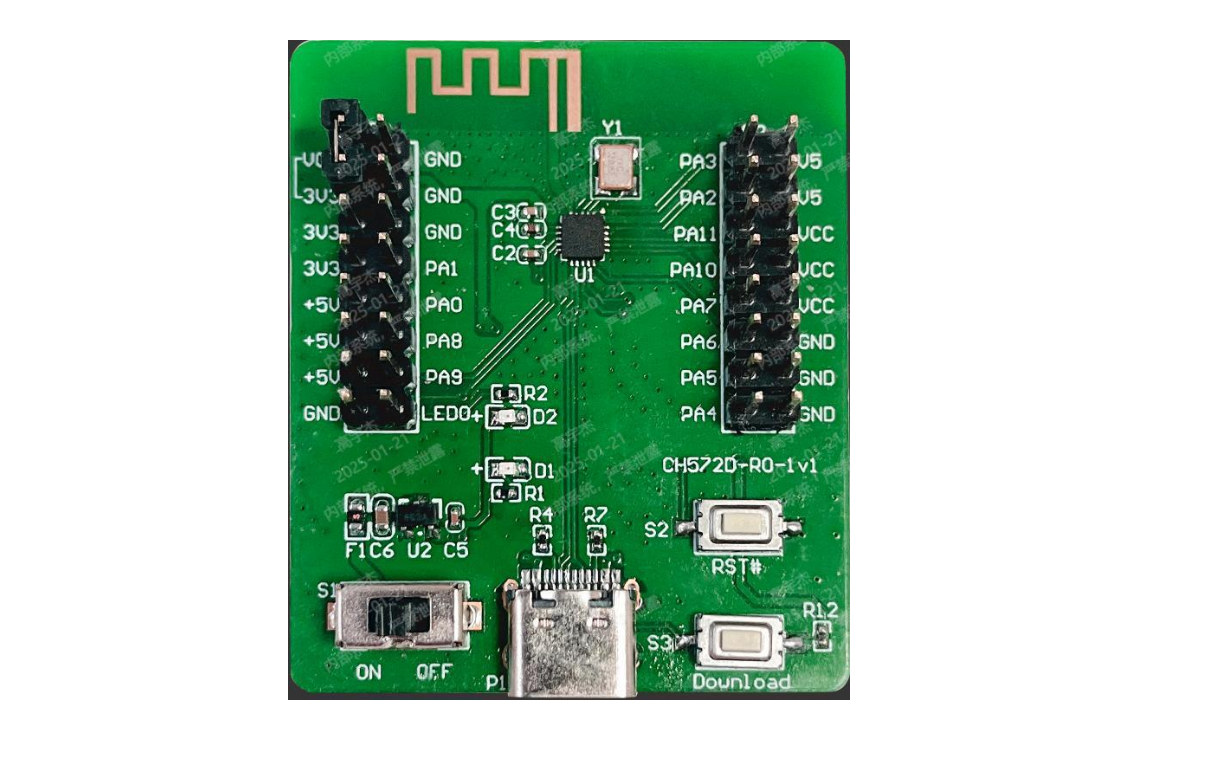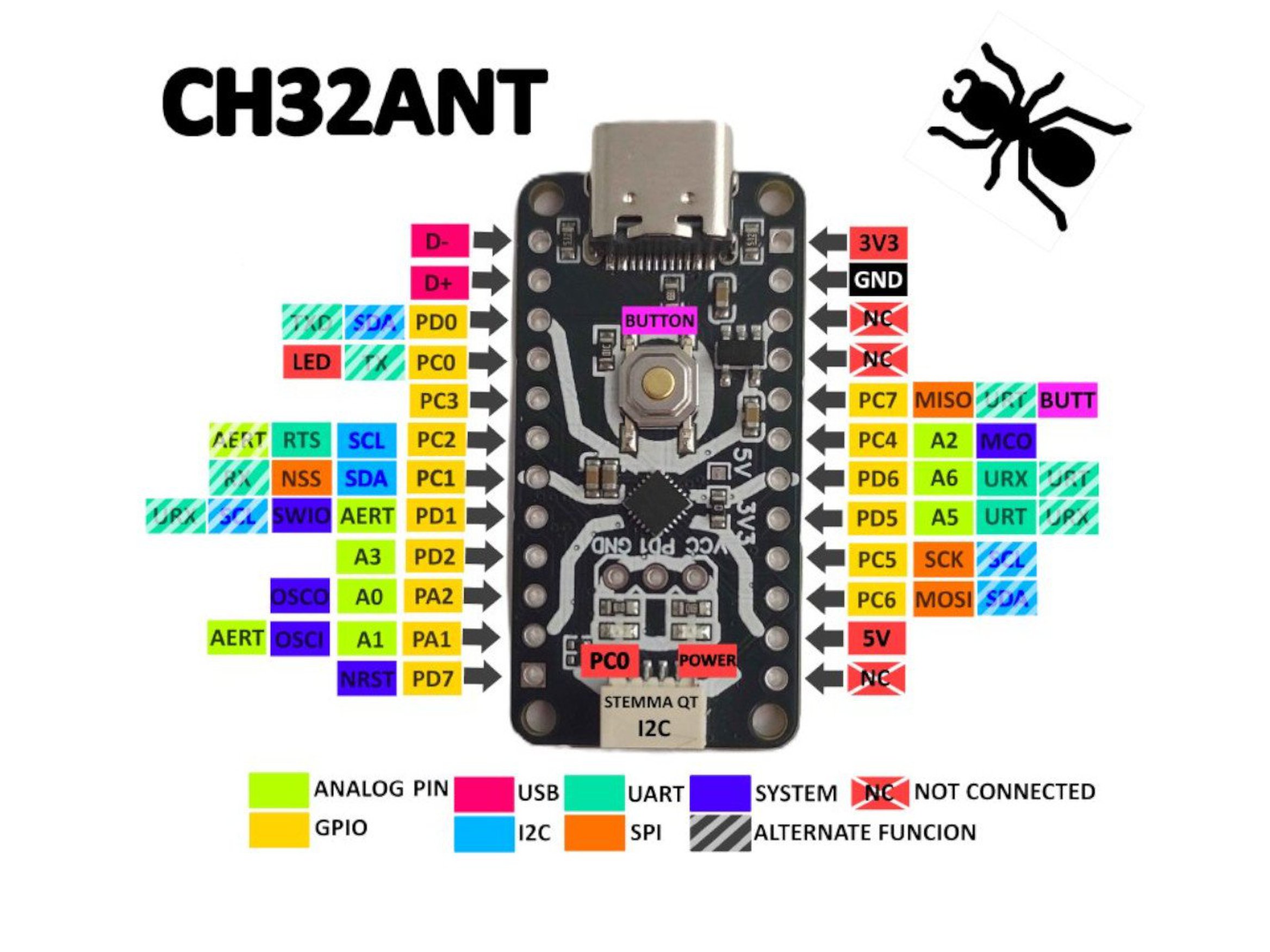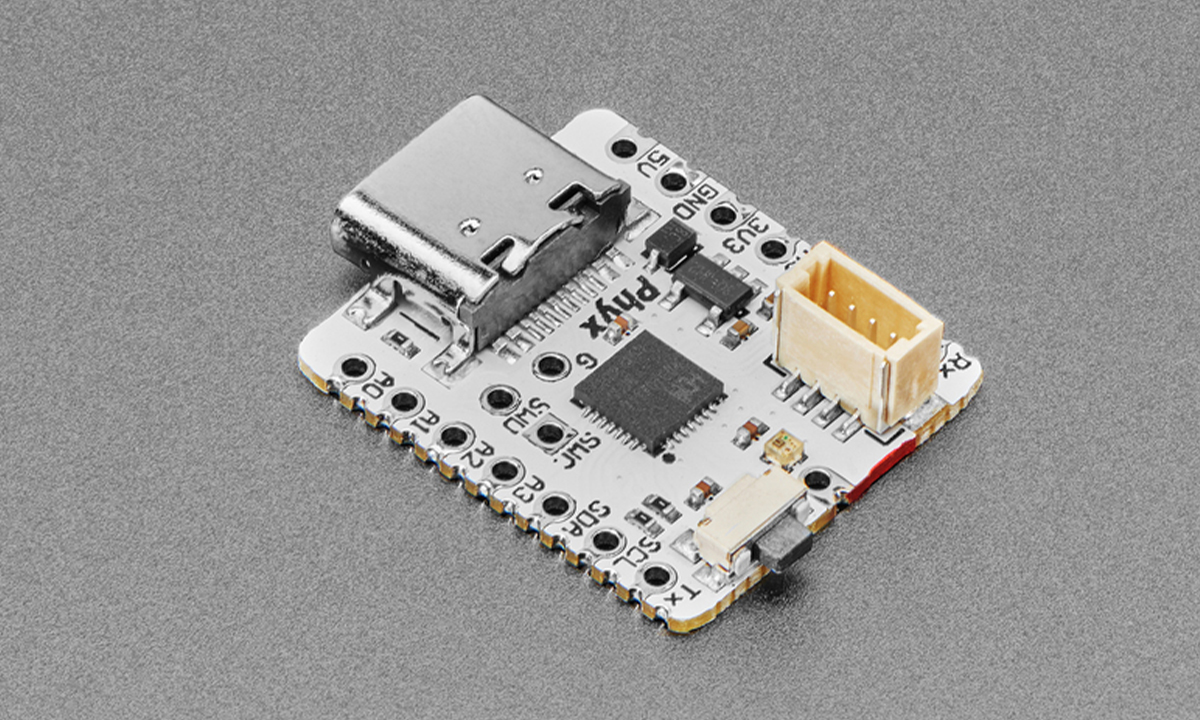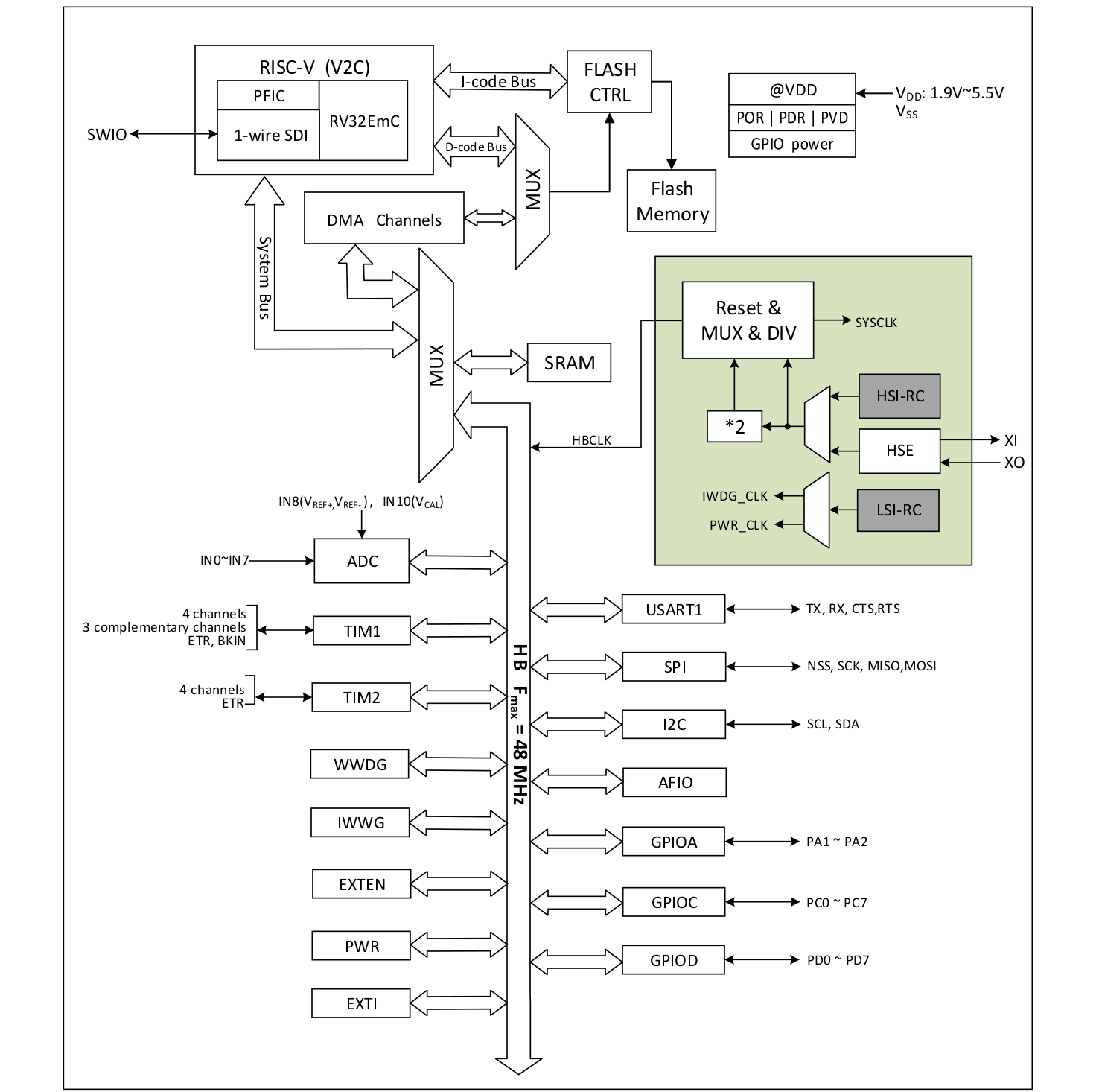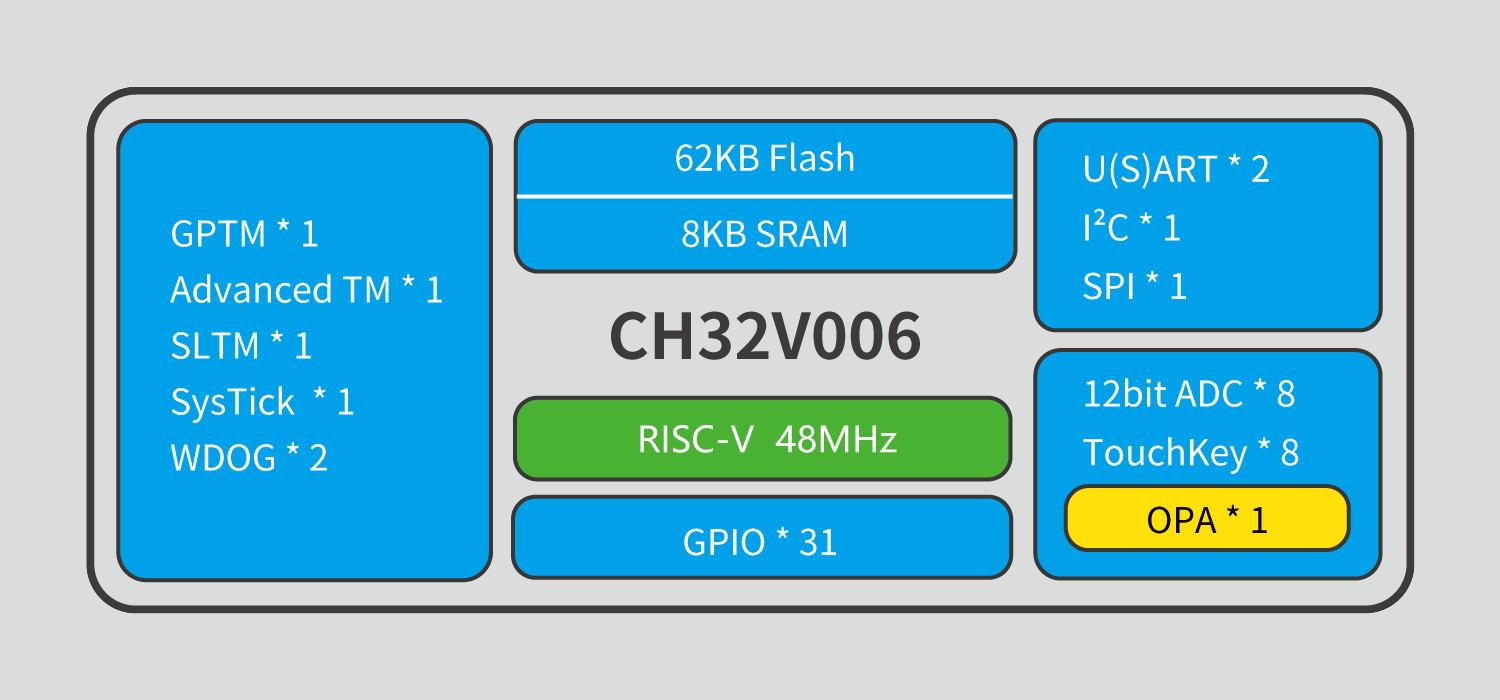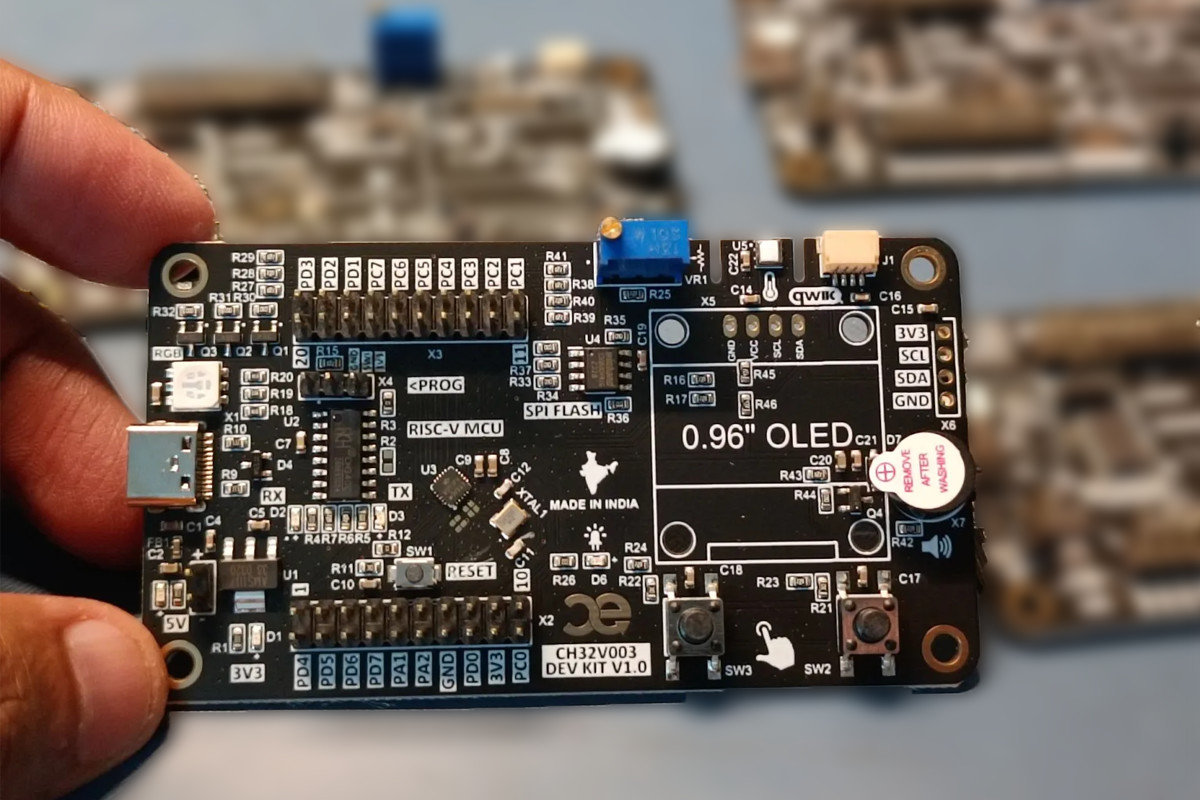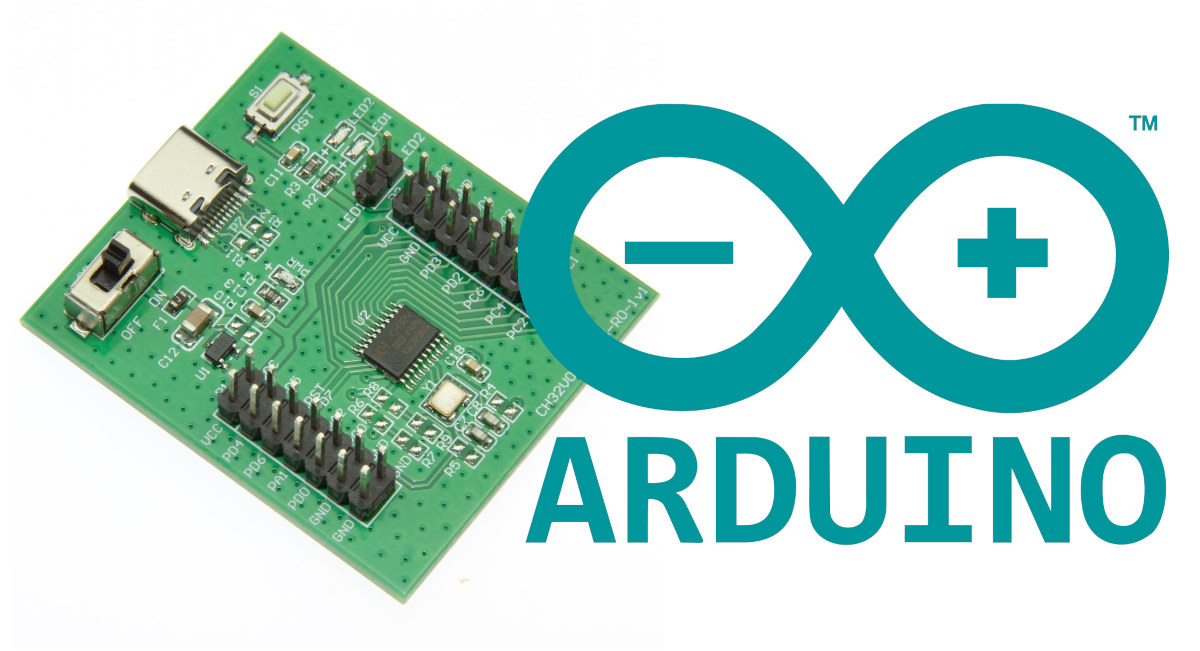Patrick Yang, CTO at WCH, has recently unveiled the CH570 RISC-V SoC with 2.4GHz wireless and USB 2.0 (host & device) as an upgrade to the popular CH32V003 general-purpose RISC-V MCU with more features at the same low price (10 cents). CH570 also comes with 12KB SRAM and 256KB flash (vs 2KB SRAM and 16KB flash for the CH32V003), offers up to twelve GPIO, six PWM, I2C, UART, SPI, and a 20-channel key detection module. There’s also the CH572 with the same features, except it also supports Bluetooth LE 5.0. As a side note, I wrote about the CH572 RISC-V MCU with BLE in 2019, but I guess it was scrapped likely because it had OTP instead of flash…, and the new CH572 (2025) is different. WCH CH570/CH572 specifications: CPU core QingKe 32-bit RISC-V3C core @ up to 100 MHz (RV32IMBC instruction set and custom instructions) Low-power 3-stage pipeline High-speed […]
$5 CH32-Ant CH32V003 RISC-V development board comes with Stemma QT connector
The CH32-Ant is a low-cost, breadboard-compatible development board powered by the WCH Electronics CH32V003-F4U6 RISC-V microcontroller, ideal for prototyping. It is pin-compatible with Prokyber’s ESP32-C6-Bug, offering an easy transition for users who don’t need wireless capabilities or the higher performance of the ESP32-C6FH4. The board features a Stemma QT connector for straightforward I2C sensor integration and a USB Type-C port that supports data transfer and power through software-based USB on the CH32V003. The CH32-Ant offers configurable logic voltage at 3.3V or 5V, adjusted via an onboard 0-ohm resistor, providing flexibility for sensor projects. Powered by the CH32V003F4U6 microcontroller, it operates up to 48MHz with 2kB of RAM and 16kB of flash, making it cost-effective for applications requiring basic processing without wireless. The CH32-Ant features a compact layout designed for breadboard compatibility, a Stemma QT connector for an I2C module on one end of the board, and a USB Type-C connector […]
Phyx LANA-TNY – A WCH CH32V203 RISC-V development board for embedded applications
The LANA-TNY is a compact development board created by Phyx and built around the CH32V203 RISC-V microcontroller. It offers a low-cost solution for embedded development and features a built-in USB bootloader, eliminating the need for an external programmer to flash the firmware. With a USB-C connector and a minimalist design, the board provides essential components to start development quickly. At its core, the Phyx LANA-TNY is powered by the CH32V203G6U6, a 32-bit RISC-V microcontroller from WCH Electronics, capable of running up to 144MHz with 1-cycle multiply/divide operations. It includes 10KB of SRAM, 32KB of single-cycle Flash, and 224KB of additional external flash for program or data storage, though the external memory operates at a slower speed. The CH32V203 microcontroller supports a range of peripherals, including ADC, timers, USB devices, UART, I2C, and SPI, making it suitable for a wide variety of embedded applications. Designed in the style of Adafruit’s QT […]
WCH CH32V002 32-bit RISC-V MCU comes with 4KB SRAM, supports 2V to 5V DC supply voltage
WCH CH32V002 is an industrial-grade general-purpose 32-bit RISC-V microcontroller that is pin-to-pin compatible with the popular CH32V003 MCU with 4KB SRAM instead of 2KB, a wider input voltage range from 2V to 5V, and other improvements. Earlier this month we wrote about the WCH CH32V006 RISC-V microcontroller that offers an upgrade to the CH32V003 with more I/Os, memory, and storage, requiring a new PCB layout. But now, the Chinese company has unveiled a pin-compatible alternative with the CH32V002 that adds more SRAM, uses the new V2C core with RV32EmC instruction set (also used in the CH32V006), offers a larger bootloader and configuration memories, upgrades the ADC to 12-bit, and adds support for 8-channel touch-key channel detection. WCH CH32V002 specifications (highlights in bold show differences against the CH32V003): CPU – 32-bit “RISC-V2C” core up to 48 MHz using RV32EmC instruction set Memory – 4KB SRAM Storage – 16KB flash, 3328 Bytes […]
WCH CH32V006 RISC-V microcontroller adds more I/Os, memory, and storage compared to CH32V003
WCH CH32V006 RISC-V microcontroller is an upgrade to the 10-cent CH32V003 microcontroller with more I/Os, up to four times the memory, storage, a wider supply voltage range, the addition of a TouchKey interface, as well as a new 32-bit V2C RISC-V core instead of the V2A core found in the CH32V003. More specifically that means we went from the CH32V003 with 2KB SRAM and 8KB flash, up to 8KB SRAM and 62KB for the CH32V006, and 6KB SRAM and 32KB flash for the CH32V005, a smaller sibling of the new RISC-V microcontroller. WCH CH32V005 & CH32V006 specifications (with highlights in bold to show differences against CH32V003): CPU – 32-bit “RISC-V2C” core up to 48 MHz Memory – 6KB SRAM (CH32V005) or 8KB SRAM (CH32V006) Storage – 32KB flash (CH32V005) or 62KB flash (CH32V006) Peripherals Up to 31x GPIO with interrupt support (CH32V003 had up to 18x GPIO) 2x USART interfaces […]
CAPUF Embedded CH32V003 RISC-V Dev Kit features USB-C, temperature/humidity monitoring, OLED & more
CAPUF Embedded CH32V003 Dev Kit is an all-in-one development board with a USB-C interface, onboard sensors (temperature/humidity), an OLED display, SPI NOR Flash, and ample I/O options. Additionally, it features a Qwicc connector, an RGB LED, and a 3-pin header to connect the WCH-link programmer providing further flexibility for your projects. After the initial release of this “10 cents” CH32V003 RISC-V microcontroller, we have seen $1.5 development boards and an open-source GGC toolchain, as well as Arduino support for the WCH RISC-V microcontrollers. Very recently, CNLohr even managed to transmit LoRa packets with this MCU. CAPUF Embedded CH32V003 Dev Kit Specifications: MCU – WCH CH32V003F4U6 32-bit RISC-V2A microcontroller up to 48 MHz with 2KB SRAM, 16KB flash (QFN20 package) USB – 1x USB-C Port for Power (5V) and Serial Interface with onboard USB to UART converter I/Os – 20 Pin MCU IOs with USART, I2C, SPI, ADC Program & Debugging – […]
LoLRa project – Transmitting LoRa packets without radio using CH32V003, ESP8266, or ESP32-S2 MCU
The LoLRa project is a firmware-only LoRa transmission open-source project that works without a Semtech radio and instead relies on an I2S or SPI interface (so not exactly bit-banging) to transmit data with microcontrollers such as WCH CH32V003, or Espressif Systems ESP8266 and ESP32-S2 microcontrollers. LoRa is a proprietary protocol by Semtech, but people have been trying to reverse-engineer the LoRa PHY for years, and this culminated with a LoRa GNU Radio SDR implementation last year. But CNLohr found out you don’t even need a radio to send LoRa packets and you can instead use SPI or I2S interfaces from general-purpose microcontrollers to send packets that can be decoded by commercial off-the-shelf LoRa gateways and other chips. The current implementation is designed for the ITU Region 2 (aka The Americas) targeting the 902-928MHz frequency band, but the code could be changed for Region 1 (EU, Russia, Africa) to target 863-870MHz […]
WCH RISC-V microcontrollers can now be programmed with the Arduino IDE
WCH has launched some interesting RISC-V microcontrollers in the last year or so, including the “10 cents” CH32V003 RISC-V microcontroller with 2KB SRAM and 16KB flash or the CH32V307with more resources (up to 64KB SRAM and 256KB flash) and additional peripherals. So far they were programmable in C language using MounRiver IDE or an open-source toolchain, but WCH has now announced Arduino support for many of those RISC-V microcontrollers which should enable more people to get involved. The core library for CH32duino works with OpenOCD through WCH-LINKE hardware to download the firmware and debug WCH chips and a riscv-none-embed-gcc toolchain that supports custom RISC-V instructions (half-word and byte compression instruction extensions and hardware stack push/pop functions) found in WCH RISC-V microcontroller. The following evaluation kits are currently supported with ADC, DAC, USART, GPIO, EXTI, SysTick, I2C, and SPI peripherals: CH32V003F4P EVT board CH32V203G8U EVT board CH32X035G8U EVT board CH32V103R8T6_BLACK EVT […]


